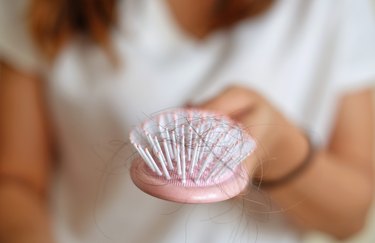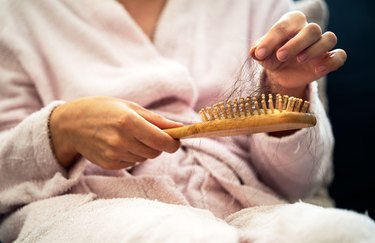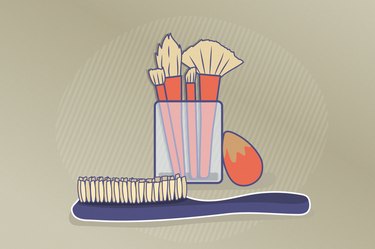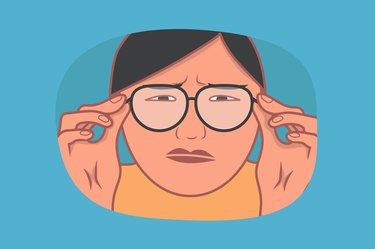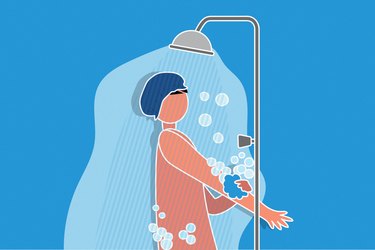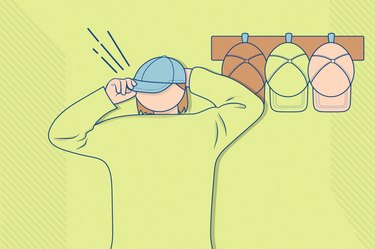
Wearing a hat can be a quick way to elevate an outfit or hide a bad hair day. It's a tried-and-true accessory made for all seasons and many occasions. But wearing a hat every day can have some potential drawbacks (besides hat hair) if you aren't careful.
Here, Aanand Geria, MD, a New Jersey-based dermatologist and founder of Geria Dermatology, explains if wearing a hat can cause hair loss and offers tips to protect your locks when wearing a hat.
Video of the Day
Video of the Day
Do Hats Cause Hair Loss?
The odds of a hat causing hair loss are slim, but it can happen — and it usually comes down to how the hat fits on your head.
"An excessively tight hat could decrease the blood flow to hair follicles and the scalp, which could cause hair to fall out," Dr. Geria says. "This is called traction alopecia."
Traction alopecia happens when there is repetitive tension on the hair roots, per the National Institutes of Health. A tight baseball cap or beanie that pulls on your hair every day could cause traction alopecia if you consistently wear it.
According to the Mayo Clinic, signs of traction alopecia include:
- Thinning hair on the top of your head
- Bald spots
- Loosening of hair
- Redness or swelling on the scalp
Traction alopecia is a preventable condition: Wear loose hairstyles, take breaks between wearing wigs and tight braids and avoid hats that are too tight, per the University of Iowa Hospitals and Clinics.
The condition is also reversible in many cases if it's caught early enough. If you take away the source of the traction (i.e. stop wearing a tight hat), your hair will usually grow back. If it goes on too long, though, traction alopecia can cause permanent damage to the hair follicle and lead to irreversible hair loss.
A Note on Language
Here at LIVESTRONG.com, we carefully consider language surrounding sex and gender. We try to avoid language that implies a sex or gender binary in favor of more inclusive language, but we sometimes include words like "men or "women" when quoting an expert or other original source material for the sake of accuracy, as is the case in this story.
Other Reasons for Hair Loss
Even if you wear a hat every day, it's likely there are other factors behind your hair loss. Certain medical conditions and even life events can cause hair to thin or fall out.
1. Hormones
"Abnormal levels of androgens produced by both men and women can cause hair thinning and loss," Dr. Geria says.
Androgens are sex hormones that play a role in growth and reproduction, per the Cleveland Clinic. High levels of these hormones can cause excessive hairiness, while low levels of androgens can lead to thinning hair.
Abnormal androgen levels can be caused by many different things, including hormonal disorders such as polycystic ovary syndrome or medication side effects. Getting to the root of the problem (with your doctor's help) is the first step toward treatment.
2. Genetics
Another type of alopecia is androgenic alopecia, or genetically losing your hair, Dr. Geria says. This is a medical condition caused by your genes.
"This can be inherited from either your father's or mother's side. In males, the first sign is usually a receding hairline or bald spots. In females, the first sign is usually an overall thinning or a widening part," he says.
Androgenic alopecia can be treated with medication, hair growth supplements and/or hair loss shampoos or serums to slow down or stop hair loss from happening.
3. Medication
Speaking of medication, it can cause hair loss, too. Some medications can contribute to hair loss, such as blood thinners, antidepressants and heart medications like heparin, per Harvard Health Publishing. Even birth control pills can cause hair thinning.
Negative side effects of medications, like losing your hair, should be discussed with your doctor.
"If you think a medication you're taking is causing you hair loss, speak with a doctor before abruptly stopping the drug, as sometimes this can cause serious health problems," Dr. Geria says.
4. Stress
Stressful life events such as quitting a job, losing a loved one or dealing with an illness can all contribute to hair thinning.
This type of hair loss is called telogen effluvium, where stress pushes large numbers of hair follicles into a resting phase. It can last a few months, causing hair to fall out easily when washed or brushed, per the Mayo Clinic, and it typically occurs several weeks to months after the stressful event.
In most circumstances, this temporary problem doesn't require treatment. It can, however, be prevented by managing stress levels, per Dr. Geria.
5. Chemotherapy
When someone begins chemotherapy, their hair typically starts to fall out two to four weeks after starting treatment. This happens because chemotherapy treatment targets all rapidly growing cells, including hair follicles. This is why your hair falls out, Dr. Geria says.
"[Hair] could fall out quickly or in large chunks. Chemotherapy could also cause your scalp to become sore or tender," he adds.
Typically, hair will start growing back within three to six months after chemotherapy treatments have ended, per the Mayo Clinic.
3 Tips to Protect Your Hair When You Wear a Hat
1. Pay Attention to Fit
To prevent traction alopecia, opt for looser-fitting hats that give your hair and scalp room to breathe, Dr. Geria recommends.
2. Wear a Clean Hat
We all have a favorite hat that hardly ever gets tossed in the laundry. Wearing a dirty hat can lead to an irritated, itchy scalp and ultimately affect your hair health, Dr. Geria says.
If you wear the same hat almost every day, or at least a few times a week, aim to wash the hat at least once a week.
3. Take a Break
If you're worried about hats causing hair loss, try taking a break from wearing one every day or wear it for a shorter amount of time.
If you're experiencing any hair thinning, it's highly unlikely it's being caused by a hat, but take time off from covering your head and see if anything changes.
So, How Bad Is It Really to Wear a Hat Every Day?
The short answer is, wearing a hat typically is not bad for your hair. Hats can sometimes cause hair loss or thinning, but this effect is rare unless you're wearing a very tight-fitting cap all the time.
"Typically speaking, wearing a hat won't cause hair thinning," Dr. Geria says. "Instead, hats can protect the wearer's face and scalp from UV rays, which can sometimes cause skin cancer. This benefit is far more important than the concern that a hat may cause hair loss."
- Mayo Clinic: "Hair Loss"
- National Institutes of Health: "Traction Alopecia"
- Cleveland Clinic: "Androgens"
- University of Iowa Hospitals and Clinics: "Traction alopecia: A type of hair loss"
- Harvard Health Publishing: "Hair Loss"
- Mayo Clinic: "Can Stress Cause Hair Loss?"
- Mayo Clinic: "Chemotherapy and Hair Loss: What to expect during treatment"
Is this an emergency? If you are experiencing serious medical symptoms, please see the National Library of Medicine’s list of signs you need emergency medical attention or call 911.

